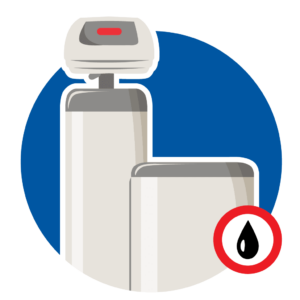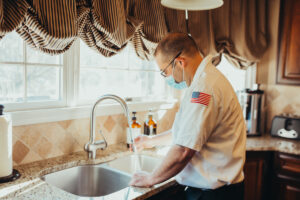
How a Water Softener Can Help Improve Your Skin
If dry, itchy skin feels like an annoyance you just can’t wash away, you might be surprised to learn that the water you’re using could be the culprit. We seldom pause to ponder the invisible substances as we shower; however, for homeowners battling persistent skin issues, hard water could be a silent saboteur.
Ready to run your shower routine through the wringer and unpack these sudsy suspicions? Grab a towel (dry, preferably) and join the exploration of how hard water might just be irritating more than your schedule.
Unearthing the Hard Truth About Water Quality
Picture this: you step out of a refreshing shower only to find patches of dry skin that have you scratching your head—figuratively, and probably, literally. The home is our haven, but sometimes the elements within it conspire against us, with hard water being a particularly inconspicuous adversary.
Insidious Impurities
Our tap water is no longer just H2O; as it journeys through underground rock formations, it gathers minerals such as calcium and magnesium. These are the distinguishing hallmarks of ‘hard’ water – in contrast to the ‘soft’ alternative – and while the minerals themselves won’t hurt, their presence in high volume changes the water’s pH level which, in turn, can leave a film on the skin, leading to dryness and irritation.
The pH Puzzler
On the pH scale, hard water tips towards alkaline, often boasting a level of about 8 (7 is neutral). This shift can disrupt the skin’s natural acidity, leading to increased moisture loss and damage to the protective outer layer. The impact may vary from person to person, but it potentially opens the floodgates to a range of dermatological dilemmas.
Assessing the Aquatic Assault
Sure, hardness is just one measure of water quality alongside turbidity, bacteria content, and such. But when it comes to our daily dose of hygiene, hard water’s complexities can make a lasting impression—therein lies the rub.
A Tale of Two Waters, Soft and Hard
To drip-feed the details of hard water’s impact, we need to compare—because every story is enhanced by contrast. A tale of two city water treatment plants might illustrate this stark difference better than words alone.
Softened for Your Benefit
In areas where water treatment softens the blow, residents often enjoy the silky smoothness post-shower and detergent savings as lather comes easier in soft water. Skin retains a more natural moisture balance, and hair feels softer because the pH levels are closer to that of the human epidermis.
Downright Harsh
In contrast, regions accustomed to hard water often complain of “soap scum” on tiles and sinks, and sometimes, the unpleasant trickle-down effects on their skin. Here, the water lingers like an impatient guest, leaving you feeling a little less squeaky clean and a little more, well, itchy.
Lathering Up the Evidence
The idea that water can be anything but benign seems to go against the fundamental laws of cleansing. Yet, the evidence is not hiding in plain sight—it’s splashing all over us as we turn on the taps.
Studies Shedding Light
Research and anecdotal evidence underline the correlation between hard water and skin health. Studies reveal that individuals with a history of eczema and atopic dermatitis often improved significantly after shifting to a softer water source. The difference wasn’t merely skin deep; it was a tangible enhancement in their quality of life.
A Shower-by-Shower Breakdown
Every shower in hard water is like a quick dip in a mineral bath, sans the luxury. The film that lingers on the skin, mixed with soap, forms an insoluble residue, leading to clogged pores, dryness, and persistent itch that no amount of scratching seems to soothe.
The Skin Stirred, Not Shaken
Skin is a sensitive soul, a veritable canary in the coal mine for unseen disturbances. When hard water is in the mix, the signs of skin distress are writ large, leaving a roadmap of rashes and redness on the body’s largest organ.
Solutions Flow Freely
Thankfully, recognizing the role of water in skin health opens the floodgates for solutions. Installing a water softener for home supply, using non-soap cleansers, and finishing with a moisturizer can be the first steps in lessening hard water’s impact on the skin. Businesses in hard water areas are also catering to this need with tailored skincare products fit for the mineral-rich challenge.
The Final Rinse
What starts as a humble routine of keeping clean ends up navigating the unseen complexities of water quality. The duty of care towards our skin extends beyond the realms of our bathrooms; it flows from the underpinning understanding of the chemical makeup of the water that washes away the day’s grime.
Homeowners, the skin irritation you fear might not be lurking in the laundry detergent or shampoo; it may be flowing right from your faucets. It’s a daunting realization, especially for those seeking more than just water’s surface utility. But armed with knowledge and a dash of detective work, you can unlock the secrets to softer, healthier skin. Before you scratch that itch or blame your next breakout on stress, consider water’s robust role in protecting your body’s most bespoke features.



